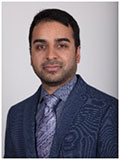
My four years at FAST played a significant part in shaping my overall personality. My aspiration to peruse a degree in engineering stems from my dream to be able to positively ‘change the world’. I was overjoyed when FAST started a degree program in telecom/ electronic engineering in 2003, and I joined as their first engineering batch. FAST was my first preference due to its unparallel international reputation, progressive academic environment with a strong alumni base; and more personally, proximity to my family home. The degree not only developed my deep technical, engineering and problem-solving skills, but more importantly the ability to work under ‘real’ pressures with challenging exams, assignments with strict deadlines, and never-ending quizzes. The tougher marking and GPA system at FAST developed humbleness and resilience in my personality along with the capability to push mental boundaries. These are the ‘golden’ ingredients for success in professional life, for which I will be ever thankful to FAST. I was also active in extra-curricular activities which led me to serve as President of Engineering societies, Chairman IEEE university chapter and President NASCON. These activities significantly boosted my interpersonal, negotiation, leadership and team working skillset which is critical to progress in the corporate world. I wasn’t a class topper, but the very well-rounded skillset I developed at FAST still helps me every day. I remained connected to the industry during degree by doing multiple internships, i.e. with Nokia, Ericsson and LMKR which boosted my confidence and professional network.
I developed an interest in control and automation systems at FAST, which led me to peruse MS in Advanced Control & Systems Engineering from the University of Manchester (with Distinction). During degree I became inclined towards the energy sector because of the sheer scale, complexity and challenging nature of its engineering projects and operations; and to support provision of the essentials, i.e. heat, light and mobility products to the planet. I was selected in BP graduate intensive program to train me as a professional engineer and have been with the same company for over a decade. I’ve worked on a verity of challenging and exciting projects and operations roles in multiple locations globally; not to forget on oil and gas production rigs in the deep waters. My quest for deeper technical expertise continued, as I got certified as Chartered Engineer by IET, TUV FS certified and OPC certified professional. I’ve remained committed to develop my skills further and completed Project Management degree from GW university and Process automation certifications from Newcastle University. Currently, I am working as digital transformation manager and automation leader on a highly exciting energy project. I have recently completed an Executive MBA from Cambridge University, and have also started my own company where we are working on cutting edge battery materials discovery AI technology.
I would like to remind the prospective Electrical Engineering students that hardware and engineering still determine the rate of human progress. The recent COVID-19 global health crisis has made this clearer. Smartphone apps for contact tracing and video conferencing, which themselves runs on hardware, have their roles to play; but ultimately it is the vaccines and medicine production, medical equipment availability such as rapid and accurate test kits including the ventilators, which have provided the long-term solutions. These are all tangible engineered products, and their manufacturing and mass distribution all depend on hardware and engineering. Similarly, dealing with climate catastrophe requires engineering innovation and solutions. The software will certainly help us to develop solutions more efficiently, but it is not enough on its own. We cannot eat or drink software and nor will it heal us, clothe us or provide us with shelter and means of transportation. Energy required to power the world, whether by greener fossil fuels, batteries or renewables, is also a multi-trillion-dollar engineering problem. Similarly, pushing the scientific boundaries in healthcare, automobile, aviation and manufacturing sectors are dependent on the engineering innovation. The software products we are all accustomed to are powered and supported by the systems and hardware. ‘Cloud’, which several industries are becoming more dependent upon, is made up of physical servers and connections, which also require energy. A single ‘Google search’ or ‘YouTube video’, activates multiple physical data centres globally, made up of integrated systems and microprocessors requiring power. The opportunities are literally endless, and I firmly believe that Engineering can take you to places unlike any other discipline.

